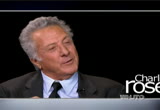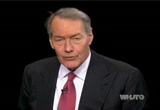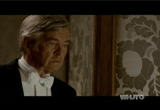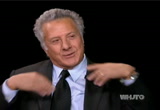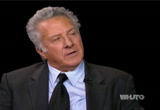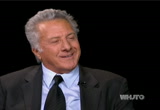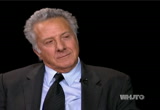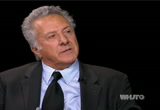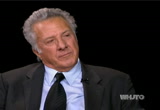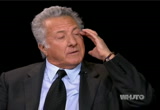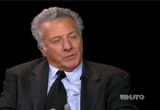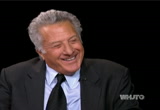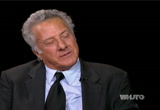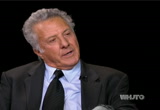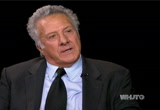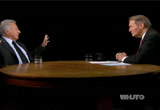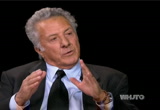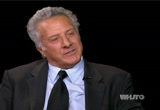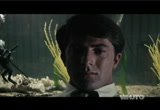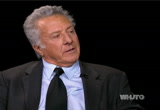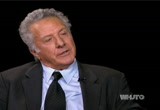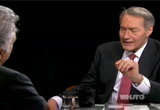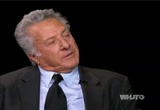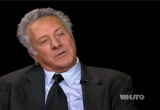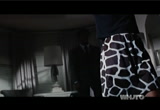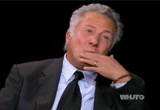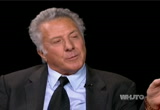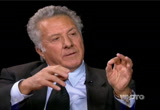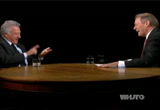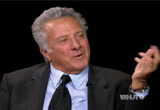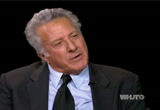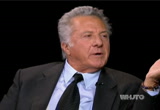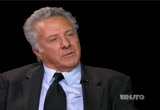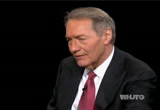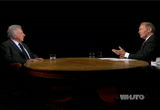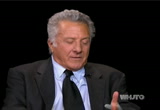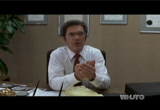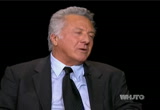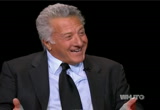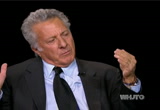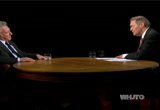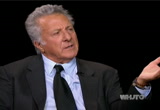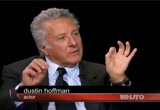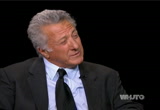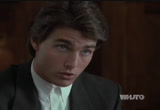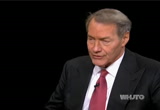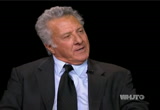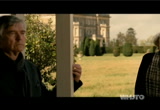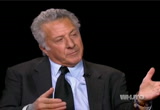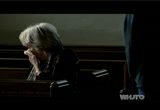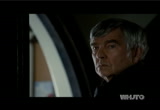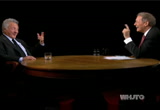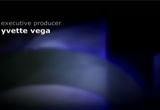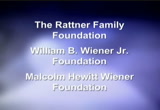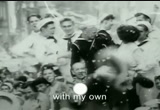tv Charlie Rose WHUT January 25, 2013 11:00pm-12:00am EST
11:00 pm
>> welcome to the program. tonight, the actor dustin hoffmann who is just directed his first movie, quartet. >> it was true of all of us it was true of me, of maggie smith, of tom courtenay, we were star, and it was with albert finny, we were stars early on. we have all been stars in a sense for 45, 50 years. and once that happened, we got the pick of the crop rses right. >> and then suddenly you get into your 40s, still get some, in your 50s, less, suddenly are you getting supporting actor, and then you're in your 60s, cameo. i die before the first act is over. and you know, it has a
11:01 pm
11:02 pm
captioning sponsored by rose communications from our studios in new york city, this is charlie rose. dustin hoffman is here, he has been acting for more than 50 years. in 1980 he won an oscar for his role as a divorced man seeking custody of his son in cramer versus cramer. in 1989 he won again for his performance as the raymond babbit in rainman. last month he was honored by the kennedy store for his achievement as an actor. now he is making his direct orial debut. the movie is called "quartet" and here is the trailer. >> at beechham house for retired musicians, life follows a rhythm all its own.
11:03 pm
>> but a new arrival. >> look. >> welcome to beachham house. the voom a beautiful suite what what we call the b wing. >> will change their tune. >> i know who it is. as large as life and twice as terrifying. >> i'm going to say something very rude. >> you, and you. >> poor things, he's having such a hard time. >> this is a retirement-- not a retirement house this is the mad house. >> we have a serious problem. we can't make it the hottest particular in town this house could collapse. we could lose it. we have four of the finest singers in english opera history. >> i don't think i want to sing with jean again. >> they were married once but it didn't work out. >> we were different people then. >> i have a brilliant idea. >> i condition remember, what is it? what made you top singing. >> you must understand i was someone once.
11:04 pm
>> why do you persist in slurping with me. >> older man, vintage wine, seasoned wood. >> this is the first time we've seen each other if god knows how many years. >> 97. >> is it really that long. >> everybody thinks that opera and rap are two different things. it's just talking for us and for you it's just the way that you sing. >> their love of life sin affectcious. they inspire us. >> it's not too late. >> until he sings. >> i think i possibly am although i find it very difficult to tell the difference at this age. >> rose: i'm pleased to have dustin hoffman back at this table. welcome. >> thank you, charlie. >> rose: i saw you at the kennedy center longers, robert demiro-- de niro gave you this wonderful introduction.
11:05 pm
a big honor. >> well, you know, i was not, they don't tell how is going to speak there. >> i know, i thought you had selected and then i said no, it's not the honoree that selected. they select who speaks. >> and they don't tell you. and i didn't know i was going to be first up. so i have already braced myself for the enormity of the occasion. and i love that they let me take 16 members of my family including two grandchildren. and we met the president and the first lady and we're sitting down. i say i'm going to be okay am i will sit through this, sitting next to the first lady and they say ladies and gentlemen, robert de niro and he comes out. i say i wonder what he -- >> i said yes, and i'm first up and he starts. and i have known him for years and he starts talking about me in ways that he's never done before. and i was gone. and i started -- >> oh really. >> because we don't talk, we don't talk actor talk to each other, you know, he's a lovely man. >> but he captured you, didn't he. >> yes, he did. >> why did it take you so long? >> to direct?
11:06 pm
>> to direct? >> you know, i did direct a thing in 77 called straight time. >> but you fired yourself. >> yes, i did. and i made a mistake. >> in firing yourself or hiring yourself. >> maybe both. >> and i had cast it, i cast the crew and actors. i worked with the writer who was an ex-convict. had done a lot of research, loved the project. it was about recidivism. and i done know what happened. i think i mean you develop projects but when you are, you know, a celebrity you get, you know, first choice of scripts, usually. so they would be-- sorry they would be coming in and then would you put what you were working on aside and do the job, then come back and try to remember where you were. and i think that you think you've got all the time in the world. and that at a certain point you realize the game is rigged. >> there is an end game. >> yes. and i think that's why.
11:07 pm
>> really you began to think about if i don't do it now i will never do it. >> that's what happened on this occasion. >> how did you find this particular project. >> i did a film called last chance harvey. >> you and emma thompson. >> they was wonderful. >> my god, she's lovely. >> rose: a small fill testimony that had imagine eck. >> thank you. and by the way -- maggie smith,. >> they don't really care, they are rehearsing all day long, they are doing a two shot and they say i don't think they're going to cover this. you know, come on out and i said, you know, and they're wonderful that way but anyway did that film. the cinematographer was john deboarman and we would talk shots during the movies. you sound like you should be directingment and i said find me something. because it is called show business. and even if you are, you know, famous as an actor for years, they don't send you
11:08 pm
scripts as a director until you've proven yourself. so i, very rarely got, and unless they needed you as a star okay we'll let you direct. >> so what happened with this, the cinematography worked on the film you and empty-- emma thompson. you said i would like to look for something, he knew the producer. >> he worked for the producer when he worked, two directors had been with this project quartet. they fell out. that is the only way i get offered somethingness. >> rose: somebody gets fired. >> two people get fired. so-- so the day before i catch the plane to am could back to los angeles from london he calls mement and he says i've got a script. and he sent it and i read it on the airplane. and it moved me but i would have-- . >> rose: moved you, you were crying. your poor wife looked at you and says why are you crying. >> were you on that plane. how do you know that? it's true. i started crying. >> rose: you said you got to read this. >> and she read it. >> rose: and so what was it
11:09 pm
about this story? tell us what the story is about and then what was it about this story. >> well, there is a documentary worth seeing called tosca's kiss. and casa verde exists to this day in milan. >> rose: a place like this. >> yesment and this is what sir ronald harwood modelled, in a sense this is what inspired the film he wrote was off of this casa verde, was very wealthy, toward the end of its life he built a mansion for himself and stipulated in his will that when he dieds, all of these opera singers and musicians that he had worked with, all his life who at one point had layed lascala who had been celebrated now couldn't pay the rent. he said i want them to have a home. and that's-- that got me, because well for the same reason i guess it gets me about athletes that they have such a small shelf life to be able, you know, at 36 they're old already. and to have that kind of talent. and to have to suddenly
11:10 pm
realize that no, you're over the hill so to speak. but the passion is still there. and the desire is still there. i think recently not too long ago i read about an interview that-- well, an article or something but that placido domingo had done some concert or opera in new york. and his wife said to him afterwards that's the last time you going to be a tennor. you're a bar i tone from now on. and he laughed longer than most. >> i've asked people like-- and people often think it's because of the money. it's never because of the money. it's most often because it's what they know and do and what they love. it's where the passion is. >> yes. >> and so they try to extend because that makes them happy. they love everything about it. they love the applause. they love, you know, the idea of doing the thing. but in the end, it's hard to let go. >> well, you know, mortality
11:11 pm
is kind of the cloud that hangs over the film. and they fight against it. and i have always felt that when i'm working you're never going to die. as long as are you working the whole idea of mortality, of being temporary doesn't exist. you are living in a timeless world when you work. >> when you decided to do this and so they get to you do the film. the casting had been halfway there. >> yes. >> and maggie which was a god send, that is a god send. >> yes, tom courtenay was in. >> yes. >> rose: albert fini was in. >> yes. >> rose: and then decided no to the. >> he was not up to it physically. and i cast billy connolly. >> rose: who is younger than the character. but you thought he would be right. >> well, he never ceased telling us that he wasn't 70 yet. the rest of us were all in our 70s. with a scottish accent, i'm only 69. >> rose: but you thought coplay 70.
11:12 pm
>> yes. yes. with help from lighting. >> rose: what did you think you could bring to this movie? >> after i saw tosca's kiss about real opera singers retired, about real-- i hate that word is so repugnant. >> rose: retirement. >> yeah, i'm retired. i'm a retired opera singer. and musicians t hit me. i turned to the cinematographer and i said we have to get the real thing. we have to get real opera singers, retired and real retired musicians. and once i got the okay to do that i felt that we had a movie. we had a shot because we were going to integrate these stars, maggie smith, pauline collins, billy connolly, tom courtenay where the real thing. and what we didn't expect is that no-- these people were at the top of their game at one time, had played places like la scala and at the end
11:13 pm
we show credits and i wanted to show what they had done. and no one had rung their phone in over 30 years. so these are people in their 70s, 80s and 90s that are suddenly hired after being dismissed by the culture in a sense. >> rose: and that is all they know how to do. >> yes. and they show up every day at 6:00 in the morning, in rather cold weather w such drive and such passion, in a sense the movie was about the movie. and it was not a job for anyone in front or behind the camera. it really was a spiritual journey for us to be with these people. >> rose: and they informed the way you saw the whole scene. but you also had things you wanted to say about growing older too, did you not. >> how did you know. what little bird told you. i think you do your best work when it somehow, well, olivia, when i worked with him said everything dow should be odd owe biographical.
11:14 pm
and i have never forgotten that. >> rose: the marathon man. >> yes. and i, you know, it was true of all of us it was true of me, of maggie smith, of tom courtenay, we were stars, very-- and it was with albert finny. we were stars early on. we have all been stars in a sense for 45, 50 years. and once that happened, we got the pick of the crop. >> right. >> and then suddenly you get into your 40s. still get some, in your 50s, less, suddenly are you getting supporting actor. then you're in your 60s. came ro. i died before the first act is over. >> and you know t has a subtle effect on you. >> yeah. >> and i think that's what i said to all of them. i said when we shoot this thing let's put ourselve in there. let's let us show what that feels like in a sense. >> you have said before that the body gets less powerful
11:15 pm
saying this in a nice way. >> compromise. >> compromise is a better way. but the spirit doesn't and the spirit can grow. >> yes. yes, it can. because, and it should. because suddenly i think like anything, when you see the end of the tunnel, either you stagnate and get bitter or whatever, or -- >> which is probably the worst thing you can do with your health. >> i believe people who are ackers will live longer. because i think once you stop and you don't function and you give in, you know, then you simply accelerate the end. >> yes. i was sensitive to articles, newspaper things, i read while i was making the film. the best one was this guy that was being interviewed in london. he had participated in a triathlon which is what swimming, bicycling. >> rose: running. >> 94. >> yeah.
11:16 pm
>> and the question they asked him was are you going to do this again. and he says yes, i'm going to keep doing it until i get old. and i have never forgotten that. >> what did you bring to this because of the remarkable career you had in acting it to directing. what did that give new. >> well, i think some of the best directors were actors, ben a flect, warren beatty, i mean you know t doesn't hurt. >> but what does it give you. >> well, this is a long answer. because this is a hundred-year-old art form give or take. in fact, i think i'm almost as old as sound, you know, really, because i was born in 37 and i think sound came in around 29 or 30. and it's about the machine, unfortunately, is that you go to work and the clock is ticking and it's like a train coming to run you over and the film is like a canvas on a railroad track. and the closer it gets, and
11:17 pm
so just before the train hits you pull, and that's your day's work and ultimately your film. and the problem with it is that every one behind the camera, the cinematographer, the costume director, the production designer, the location manager, the casting director, the director, the writer, they have what is called pre, preproduction and that is called preproduction. and these are months and months and months of time to keep making mistakes, to fail and then discard what they have until they arrive at what they want. and then we start shooting. the actors have not been a part of this process. in plays you get to rehearse, here, no, so are you in your camper, okay, we're ready for you. you come out and that 150 people that have been exposed to the material for months and months and months want to you get it within about 10 minutes. and i think what i brought to it is to say to the production people we're going have to accommodate to
11:18 pm
allow these actors, well beckett said fail, fail, fail better. >> rose: get better every time you fail. >> yes, and to give them that time. and i think that is the best thing you can give an actor. >> rose: i think maggie smith said that too, why she appreciated what you were able to do for her. is it difficult to direct actors that are that good, though. i mean are you uncomfortable in any way saying this is the way to do it. this is what i want from you? >> no, because i'm-- it's one of the things i think i learned over, well, you said 50 years, is that there is no way to do a scene. there's five different directors that would direct the same script differently and maybe all wonderfulfully there are five different actors that would play each the particular part differently. and i think that when you see a scene, as the director it's your obligation to know what the emotional points are and what the narrative things you have to hit. but that gives you a lot of latitude. and i think it's the
11:19 pm
director's job to manipulate the ackers so that they don't even realize it. i always think it's like a kid learning how to walk. they pretend like they want to run away from you. but you're just there in case they fall. just to hold them up a little bit. and i think that actors, once that pressure is taken off of them. i maintain, i do have a lot of opinions over 50 years, i'm sorry but all those parentheticals and scripts, the actor breaks down soning. the actor, or the character. the character you know hysterically starts, you know, laughing. the character goes crazy, and you know, and is furious. take it out. take it out, take it out. don't let the actor ever see it because all dow as an actor thinking oh god what's tomorrow, thursday, i have to son uncontrollably for ten hour os. they don't need to know it. and you can find ways of getting those beats from them without them being aware, being aware, if that makes sense. >> if you are a director and a producer what you want the
11:20 pm
acker to do, you hire an factor because you think they bring something special. that you don't even have. i mean the best directors i think are in awe of actors. >> and they like them. >> exactly. >> yes. >> and half of them like hitchcock don't like actors and they can be great directors. >> indeed. >> i always thought a sign as what when you come on the set is out of the side of the eye you look at the director and he is watching the scene and he is miming every word of every person in the scene. before he came on he knows the way it should sound. he knows the way if should be underlined. and what you are saying is yes, let the actor surprise you and take it beyond where you thought it should go. >> why did mike nichols choose you? >> long answer or short answer. >> long answer. >> i mean you obviously had talent but why did he choose you? because redford was sort of the model if you listened to the description of what benjamin was. >> it's in the book. >> yes. >> six feet, blond hair, blue eyes, member of the
11:21 pm
track team, debating squad. >> none of that is you. >> none, none, none. boston, program im, you know. i think he tested redford. he tested a lot of people over a period of a year and a half or something. and he was scraping the bottom of the barrel by the time he got to me. i don't think he knew anything about me. people said i was in a play-off broadway that got very good reviews. and i don't think he saw it i think he was told about it. so he sent it to me to read. and i read the script. and then i went and got the book and i read the book. and i had a panic attack. i thought why are they trying to ruin my career, which is just beginning now. you know because i'm starting to get parts, character parts, you know, and here is a leading man. and i turned down the audition. i was in new york off broadway,s auditions were if los angeles. and when he heard that this unknown act certificate turning down the audition, he called me up. and he talked me into doing it. >> rose: what did he say? >> he says you don't want to do it because --
11:22 pm
>> and i said because, you know i'm a character acker but so far, you know, i am not 6 feet, i'm not blond, you know, and he says did you think it was funny. i said yes, i did think it was funny. he said and you don't want to do it because you're jewish? i said well, that would kind of look underlined if i did it. >> he said well maybe the character is jewish inside, and that was what made me you know, did the audition. he said later, i don't think too long ago in an interview that he never really understood why he cast me. >> rose: which is the question i ask you. >> yes. and he said, and i didn't know until i read it, he said i think i was casting hoffman because the character was my alter ego. >> rose: really. >> yes. >> rose: i saw myself. >> yes. and he didn't think of himself as attractive. what i do know is a fact is that i finished shooting. i went back to new york to collect unemployment. i made $3,000, i think, put
11:23 pm
it in the bank, started collecting unemployment. and after the film is edited in los angeles, they start showing it to homes that have screening rooms. >> rose: that is what they do in hollywood, they show it to their pals. >> yes. and they did that. and the producer, larry turman and nichols both in separate articles or interviews years later, i read for the first time, that people came up to them after a screening and said what a great film you would have if you didn't miscast the lead. >> yes. >> and that was absolutely what that town felt. >> rose: but not mike nichols. >> that was maybe one of the most courageous things every director has done. >> rose: but it goes back to what he said once to me, he wants an actor to surprise him. my guess is you surprised him. >> yes. >> rose: you gave him a look at this character that he hadn't thought about it and he liked it. >> yesment and you know what he did. he came from the theatre. he was the hottest theatre
11:24 pm
director i think in town. and he did what we were taught to do, whether it was straussberg or stella adler or sammy myner is that you start with 0. you don't try to do anything. you just say the words and stuff will start to come to you. and he allowed us to do that in rehearsal. he said don't try to play characters. i have no-- and he didn't it goes back to what i was saying before. he didn't predetermine what anything should be. and he really let, i mean coy give you examples, you know. >> rose: give me an example. >> he said do you think this character is a virgin. >> and i said no, i said but i don't think he's ever screwed his mother's best friend. i say screwed rdz yes. >> sex with his mother's best friend. so i am rehearsing with ann bancroft and he-- and he says think about that, first time you ever made out with a girl, how old were you. i says i guess about 15, i think. i says i was a piano player
11:25 pm
and i was supposed to play bumble boogie for the 1,000,000, time at an assembly. we were in the basement wait to be called and the girl was doing, today would be considered racist but she was doing al jollson in black face singing mammy. and she is sitting next to me waiting to be called for rehearsal and somehow we look add each other and we kind of start to experiment, sexually. but i can't get too close to her because she's in black face. so i told him this story. and i put my hand on her breast and we are just sitting there in chairs facing the wall, fully dressed. and she looked and she just let me do it. and i told anything tolls-- next ols the story. also cut to the scene where i'm rehearsing with ann bancroft in the hotel room. he said the neck time you do the scene i want to you go up in back of her, she has just taken her sweater off, you are in her back, just hold her breast and let's just see what happens. and i did it. and she had been looking at
11:26 pm
her sweater, and she acknowledged barely that i was holder her breast and she went back to try to rub off, what was on it. it was brilliant. i started laughing. and i thought n those days, well, probably today too if you are an unknown actor if are you caught laughing it is the worst thing you can do because are you breaking character. and i turn my back on nicoles who was sitting there and i walked to the wall and i kept saying don't laugh, don't laugh, don't laugh, you're going get fired. and i couldn't get myself together. and i started banging my head against the wall saying stop laughing. and he starts laughing. and that is in the movie. the whole thing is in the movie. >> would you help me with this please. >> certainly. >> thank you. >> you're welcome.
11:27 pm
>> benjamin would, this be easier for new the dark. >> mrs. robinson i can't do this opinions what. >> this is all terribly wrong. >> he kept putting in in these ago accidents that happened from really the actor bringing forth what he felt, you know. >> rose: when you went to make-- direct your movie did you go to any of these guys that you had been directed by that are still alive or-- and say what do i need to know? >> you think i should have? >> rose: the answer is no. >> right. >> rose: you didn't. >> no, i didn't. >> rose: why not, because you didn't think you needed it or -- >> well, i mean what are they going to tell me there say funny story. >> rose: what are they going to tell you about making movies you don't railroad know. >> correct. steven freers, the film director told me, he went up to houseton and said can you
11:28 pm
give me any advice. >> he said how many days are going to shoot kid. >> he says 28. he says 28, well if you compromise just once that's 28 compromises. that ought to sink your film. he turned around and walked away. that's brilliant. but the thing about me being a perfectionist, i refuse to take the charge. because nichols was my first director, john lessinger was my second. and they board refused to start shooting unless they got a month of rehearsal which is very difficult to get from film people. we're paying all this money, the crew is hired. you better be shooting. and that's what happened with those directors and what continued to happen on the set. they were the perfectionists. and i thought that is the way movies are made. i mean we could have shot graduate, i learned now, it's a small movie. few actors, four walls,
11:29 pm
couple extra, could have shot it 50, 60 days. he spent a hundred days shooting that movie. they taught me this perfection. >> rose: you have directed some theatre though hadn't you. >> yes. >> okay. so you got casting. you got a good cinematographer that you know and worked with before. >> for quarter tell. >> rose: yes. so you got a great cast. >> yes. >> you love, are you passionate about the theme. >> yes. you have got as i said the cinematography. you have a text you like. >> yes. >> rose: so what is there left for you to do? >> a lot. it's very hard to make a good movie. >> rose: really y. >> because it's an artificial set up. i mean you are interviewing so i'm guessing you can interview and then go in and easyity. but it is a secondary process. what if you have to edit as are you -- >> interviewing. >> yes. >> and that makes it difficult. and you have a list of questions and who he ever, the producer says you have to ask every one of these questions. >> rose: no, i don't work
11:30 pm
that way, it is just a conversation. >> you wouldn't want to be in the movies that is what the movies are. >> rose: the thing in movies that is difficult for me is that you have to know the other person's lines because you have to know when you come in. you have to know pacing and rhythm. >> you mean as an actor. >> don't you, don't you have to know essentially that you are going to say what you are going to say. >> kind of you know the last line. the last few words. you got to know what tees can up for you. >> yes. can i use-- whatever word you want to use. >> de niro i just go by what i remember, he gets a script and says i don't know about you but i go -- my part. and that's what actors do. you just look at your own part. >> i don't care about that. >> but you remember-- the guy before you ends with the word or kid, that's when you come in.
11:31 pm
>> rose: some people, i am fascinated by this. people have heard me on this program over these 20 years say this more than once it is that bill nye, the british actor told me that acting is making it appear as if you have just had the thought. whatever you say, it's like you have just had the thought. >> yes. >> rose: he is sort of right on target, isn't he. >> yes. >> rose: that's what it is. >> yes. >> rose: how does an actor can strip away all of this, knowing what he ask going to say and make it sound like i just had this thought this is the way i would say this if i just thought the thing. >> easy answer. >> rose: what. >> don't learn your lines. >> rose: are you serious. >> i'm serious s have a sense of them, have a sens sense-- you mentioned brando when we were talking, when i first came in. and brando he really did put the lines on the ceiling. and he would do that famous brando, and he would be looking at the lines. >> rose: there a wonderful story if you want me to tell you.
11:32 pm
de the ftthew broderick. and i did a film with path u broderick and matthew broderick was scared to death to work with brando because brando tilted the axis of american filmmaking. and he keeps waiting for the day he's going to work with brando and it's going to take place in a dorm room. and the day comes. and they tell matthew now brando likes to improvise, he may not say the words so whatever, so you just have to go with him. he said all right, all right. matthew tells it much better, i will tell it quickly. so matthew is sitting on the edge of the bed, brando on the other edge, they had this much distance between them and they start doing the scene. and in the middle of the take brando says, you know, i can't hear i can't hear-- i can't understand one word you're saying. he says, he said, are you eating tuna fish. and broderick goes like this he says, he's improvisinging don't know what this has anything to do with the scene. so he keeps going. he says i'm telling you, i
11:33 pm
can't understand a word you're saying. is that tuna fish you're eating. and finally he realized that brando had a hearing thing in his ear. and his assistant in the next room was eating a tuna fish sandwich while he was supposed to be giving the lines. >> rose: so the assistant is feeding the lines. >> yes. and brando is guessing, sdhes's having her favorite sandwich (laughter) >> rose: so you get these characters together. are you -- >> the actors. >> rose: the actors. >> who are also characters. >> rose: they are, yes. are you nervous. are you thinking what young directors are always saying, i got to show confidence. i have to let them know i'm in charge. i have to be on sure footing here. >> well, one thing about being 72 or 3 when i did it is that i've been through it with those young directors, yes. and they did forewarn me about maggie smith who actually called herself in an interview. she says i'm known as the
11:34 pm
acid queen. she said she'll take awe part if you are trying to con her or bull s her, she will pick it up and she will run, you know, she doesn't suffer fools gladly. and when i met her we sat down and looked at each other. i said maggie, i think we have the same reputation. and that was it. and that cleared the air. i don't understand why, i think directors, some directors that have not been ackers must be defensive in directing people that-- directing ackers when they have never been an acker. how can be be a tennis coach. >> rose: if -- >> they have never played the game. and i think they assume a mantel of assuredness that actors see right through. whereas you can be in the middle of a scene, maggie did it in the middle of the scene, i don't know what the bleep the scene is about. >> rose: she says that. i don't know what the hell is this is about. >> angry. >> rose: with you.
11:35 pm
>> not at me, just at life. >> rose: at life, right. >> just you know she thought she understood it. and i said you know, everybody goes like this i said what is the problem. and she starts to talk, you know, tell the crew to take off. and then i listen and i said you're right. i never thought of that. let's see if we can find-- . >> rose: what was she right about. what was the scene about. >> i can't remember. and then we just found a way to do it. but the other thing to say is the better the acker, the less you have to direct them. because it is shorthand, basically. i would say things like that, and that was shorthand, come on. no periods, no commas, just boom or if it was too big that, take it down. >> take it down. >> yes. >> rose: i know somebody once said ackers only do one thing. they say make it bigger, take it down. >> and say it faster. >> rose: fast or slow, up, down. >> yes. >> i wish coy stand up, i could show you. >> try it, stand up. >> you tell me if the camera can see my whole body. >> can the camera see his
11:36 pm
whole bodiment they got you right there, go ahead. >> now if i come up to here will the camera see it. >> rose: can you see him there. >> can someone tell me-- the other thing is you have to hit your marks. so spencer tracy, they said watch spencer tracy because he makes hitsing your marks which mean vus to come up, the camera there, there is a mark there, they have already decided that is where are you sharp. and you watch a spencer tracy movie. he comes and he goes like this and he does it every single time. and it makes it part of the thing. he walks in and he goes-- and he has hit his mark. anyways, i love that. >> rose: there is a guy who had a naturalness, and you don't really know, i would never know whether it was simply brilliant acting to seem to be so very natural. >> yes, yes, that's the idea. >> rose: you can't see no technique. >> that's the idea. >> rose: what is method acting? >> it's the most misunderstood-- you no.
11:37 pm
and every actor says it differently. stand lawsski as i understand it he wrote an actor prepares and another book called building a character. and all he really basically talked about is that you have your instrument, which is yourself. and there are senseory exercises that you can practice in class, for instance in life if you go into a room and you have to smell something distinctly it can take you back to when you were nine years old when you first smelled that. so you sharpen your instrument, that is all it is. and it was distorted because actors many time would go take a job and be sitting there and there was also relaxation exercises, and they would hold up shootingment and are you not supposed to go that. you have to leave what you practice in class in class, and then go and do your job. but having said that, there were giants when i studied, started studying acting. with was lee straussberg, stella adler, sanford mizner and they all argued with each other as to which was
11:38 pm
the correct way-- . >> rose: this was the 50s. >> yes, the 50s, to teach acting. and none of them agreed with it. we, we did a kind-- we sat irized it ins too see and the scene with sydney polak where he is my agent. he said you couldn't play a tomato and i was saying that's right, they wanted me to move over from here to there, and he is screaming, you know, but you said you couldn't do it because a tomorrow at owe doesn't have legs. and i said that's correct. >> i bust my as to get a part right. >> and you bust everybody's else's ass too. a guy has four weeks to put on a play. do you think he wants to argue about whether tolstoy can walk when he is dying or sing when he walking. >> two years ago and that guy is an idiot. >> they can't all be idiots. you argue with everybody. you have one of the worse reputations in this town, michael. nobody will hire you. >> are you saying that nobody in new york will work with me? >> no, that's too limiting. nobody in hollywood wants to work with you either. i can't even sign you up for a commercial am you played a
11:39 pm
tomato for 30 seconds they went half a day over schedule because you wouldn't sit down. >> it wasn't logical. >> you were a tomato. a tomato doesn't have logic it can't move. >> that's what i said so if he can't move how is he going to sit down, gorge, i was a stand up tomato, a juicy sexy beef steak tomato. nobody does vegetables like me. i did an evening of vegetables off broadway, the best tomato, best you could cumber i did an endive salad. >> every acker that saw that movie understood the substance of what that scene was really about. if you don't, if a tomato doesn't have legs then you have to figure out another way to go from here to there. and that's, you know, and painters and writers, they don't just paint the tomato or write a tomato, it's specific. in effect de niro said the statement which i love is it's all in the details. and that means that you really, you really learn everything specifically, qu learn about what are you doing in the scene. you don't just say the character is like this or the character is like that.
11:40 pm
if i am make maing any sense. >> are you. >> it is not just, it's not just a tomato. what kind of a tomato is it. and it's just a way of practicing your craft. >> but do you-- where do you go to find the details you want looking for the key to unlock a character? >> well, that's a good question. i think you just do what you do in life. i mean you observe and some of us are observers. i means that's just, you know, we're-- the best movie in town is walking outside and standing on the corner, granted if are you famous you have to figure out a disguise to do it but there's nothing like it being able just to observe humanity. i have an office in l.a., and i picked the second floor so i could, because they eat outsidement and coy just watch people eating, you know, yes, it's-- we have what we call-- you know. and ackers have what they call the phrase or the word behavior. movies are about and acting
11:41 pm
is about behavior. meaning it's not what you say, because that's usually to disguise what you are really feeling in life. it's your behaviour or now we hear words like body language that gives you up. and it's the behavior of the person. i as an example, in midnight cowboy i read the book, and it's helpful when a script comes from a book because it tends to be more dimensional. and that was james willo hur i hee and it was a marvelous book and he described the character as being like a four wheels that were one of the wheels was missing in terms of the kind of limp. and i was walking down the street in new york one day and i saw this guy limping. i thought that is an interesting limp. and i followed him. and this was near 42nd street. and i stopped behind him and i watched him. he was right there at the light a lot of people, light changes green. he was the first one across the streetment and i said that's pie guy. >> most of them are old, and
11:42 pm
dignified. you know what i mean? they can't down to times square to pick out the merchandise. they got to have some kind of middleman. and that's where daniel comes in you know what i mean. >> hey, i'm walking here, i'm walking here. up yours. >> that's ratso and i felt, and then i saw those-- a frightening example of those concentration camp photos of people with nair hands on the wire. i said he would be a survivor. he might have been a-- he pite have done horrible things to survive but we have been a survived. and then you know you kind of go interest there. >> rose: how do you do what you did in rainman? >> you know, i-- tom cruise kept getting alot of jobs, you know, famous star, and i was doing my research.
11:43 pm
so many times we had to wait for him. we were going to start shooting. then he got another job cocktailing. we go off and shoot it but i liked it because it allowed me to continue the research and i kept meeting autistic people. no one knew what that word meant in those days, 1988. and people that were some brain damaged, and some people that were, you know, down syndrome and that i parents for about a year and a half. and i just liked to get 9 information. it just take the information and make notes, whatever. then i-- i saw a documentary where this couple had a dance room in las vegas and people that were mentally ill once a week t was a dance hall for anybody. but once a week these mentally ill people from some hospital they would let them come in and dance. and photograph, and you see these people dancing and it's so extraordinary and poignant to watch.
11:44 pm
and then the documentary went over a six month period of time. and suddenly they cut and the man who ran it is sitting there veg tative, because he's had a stroke. and now he's in the room with his wife who is tallying up the day's receipts and he's like that. and i said to my wife, and that was a huge moment for me. i said she says what are you getting for that. i said i want to do that. and she said what do you mean. i said i want to try to be what i would be like if something like that happened to me. so that i'm not going out to play a character. if tomorrow i get hit with a brick or something, i want that character to-- i want to take that character inside me. so that i didn't think of myself as doing a character. the interesting thing is that when we came ready to shoot, i was awful. i-- because i don't plan how i'm going to do anything. either it just happens or it doesn't. and it didn't happen. and after three days i asked
11:45 pm
barry leffinson to fire me. i said i can't -- >> did you really. >> yes, i promise you. >> i was awful. i said i watched the russians and one time i was doing papillon, another midnight cowboy. >> it was a nightmare. >> all the rolls you played. >> yes. >> and trying to duplicate. >> not trying. they were just coming out like the flu. and i went, i can remember being in the hallway and the elevator, being there. and my wife would come, was with me seeing, and i said i'm quitting, i'm telling him. and i said to barry, i am a out. we had been shooting a week am and any other director, you know, i think would have folded. but he just said all right, all right, let's go watch it again and tell me if there is any second. any one moment where you think you are doing, you're in there. are you kind of, because it's in your head. you don't know-- but there it is, you just say to yourself there it is. >> there is the moment where you have the character. >> yes, exactly. and i pointed to two or three and he said okay then let's do that. but i was not able to do it
11:46 pm
because here we are talking. and are you looking at someone when are you talking. this character couldn't make eye contact. so somehow looking at the other person gives you some kind of reference of what are you doing. and here hi no reference. i have no other explanation for it. and it was awful. and we were doing a scene in the car where barry is next to the monitor. we're in the car w a camera that is going off on signal no one else is in the car, crews is driving. and barry said do the scene three timesment and if there is any footage left just do, they have a radio mike in there, just do the scene again and improvise. and we started to improvise and i couldn't improvise. and brando said something once. he said you can't do a character unless you know how the character thinks. he says if you know how that character thinks, how that character rationalizes his
11:47 pm
behavior, then you are starting to get somewhere. and i couldn't improvise. and i usually can fairly well because i didn't know how this character thought. and we come back and i'm thinking oh, god, barry let me out of this. he said no i want to watch this play back. he says what you are doing is, he says i think you are doing the charactered. and i said what do you mean ochlts he says i think you've got the character of the just take a look because i didn't know how to improvise. crew was ask me a question and he says and i wouldn't answer him because i don't know how the character is thinking. he says ray, did you hear me. and i went yeah, and that was it. and i could do that before a take and i was, i suddenly was in there. >> yeah. >> raymond would you like to stay with your brother charlie in los angeles. >> ray, the doctor asking you a question is so you listen, okay, ray. >> yeah. >> raymond dow want to stay with your brother charlie. >> raymond, do you want to stay with your brother dharlie. >> yeah. >> dow. >> yeah. >> you want to stay with
11:48 pm
your brother. >> yeah, want to stay with my brother charlie babbitt. >> that's you what want. >> yeah. >> it became sort of the signature for its fill number part. >> yesment and i done know what it was. but it's like, you know what they say about these people that are sav ants, they don't-- there's a vacuum-cleaner in most of our heads so that we forget, most everything, which as we have to. but tomorrow that character would remember everything in this room, the suit are you wearing, people i met outside. they would remember all of this stuff week after week, year after year, the amount of information that is in their head that alone can make you, you know -- >> in fact people tell me they start out to write their memoir and they think i'm to the going to remember anything, but one thing will key one thing and another thing and all of a sudden it all begins to come back. >> yes. >> you begin to remember the moments and the conversations and all. but if you would ask dow remember the conversation at first glance, would you say no it was a long time ago, i don't remember it. >> that in a sense is what the method was all about.
11:49 pm
that you do it through sensoree things or physical or touch things or even a sentence. but to allow it to come back. when i worked with annie bancroft, she was married to mel brooks. and she told me a funny story. so anybody under 60 may not see the human never this. or over 50 they will understand it. so she said you know, mel was volatile sometimes in the marriage because he had been a boxer. and there was one time where, he said he shoved me, you know, about five feet away from him. and ann bancroft could be very thee at call, ann ya maria talliano from brooklyn but could be the ago res. she was telling me the story because she was saying it's hard to stay mel at-- mad at mel. he shoves her and she says i'm an actress and my body is my instrument. don't you ever touch me again. my body is my instrument. and without missing a beat he said yeah, then tell it to play begin the we game.
11:50 pm
and she -- >> she was so good. let me show some clips and talk about director this is a scene from quartet in which jean, maggie smith and reggie tom courtenay remember these two people that had a relationship earlier, had not ended well for reggie. he is fearful when he sees that she is coming backment but here is a scene. take a look at it. >> in all her glory. >> oh, jean, you haven't changed a jot. >> didn't i tell you. didn't i say she still looks like a young girl. >> reggie, don't i get a kiss? reg? now apologize for hurting you. please be kind to me. we were different people then. i've been rehearsing that all the past week. >> she's up set because he wasn't warned you were coming. >> i'm not up set. >> reg? this is the first time we've
11:51 pm
seen each other if god knows how many years. >> 97. >> is it really that long? how time flies. >> rose: that's great. >> what do you think about that when you saw it. >> my first thought is that maggie is an institution. i mean she's a legend. she is one of the great actors of our time. british or american, there's never been one before, there will never be one afterwards. and tom courtenay who had become a star had not been an actor. the director saw this scrawny kid on the street and just cast him and directed him through it. so now you jump 40 years hence, and tom courtenay is to you going to act with the great maggie smith who has been acting on the stage since she's 16. and he calls me up two weeks before we start shooting. and he's very frightened. and i said tom was's the matter. he says it's hard to say. i said tell me. he says well we start shooting in two weeks. >> yes.
11:52 pm
>> what if she doesn't like me and he was serious. >> yeah. people are people. >> rose: sure. >> and i said don't get rid of that. let that be a part of it. >> rose: here is another scene. this is where jean finds reggie hiding from her in a church. here it is. >> leave! >> can't ever remember you crying. >> i can't remember you being religious. >> i'm not. i was trying to avoid you.
11:53 pm
>> i apologize for hurting you. please be kindment we were different people then. >> you said that, jean. are you repeating yourself. >> why do we have to get old? >> that's what people do. >> we have to come to some arrangement. >> i don't want to talk about it, you're here, i'm here. >> so what are we going do. >> bring -- >> what happened to forgive and forget? >> takes me back. >> takes me back to you, reg. >> he was very up set
11:54 pm
because he was to the getting the leading roles any more that he did for years and yearsment and he was getting those parts i was talking about. >> courtenay. >> the kind of feeble parts or parts for feeble people and when i met him he wanted to quit acting. he was doing radio on bbc, reading poetry. he said i would rather not take the parts that are offered me. so here he took the role and i said to him, tom, i had to say it maybe three times a day for 50 days. you are a leading man. you are a leading man. come on, stand up, put your-- you know, you are a handsome man. he said no, i'm not. >> i said you are a very handsome man because he didn't think of himself that way. and since the film's been out he gets stopped in london and he says girls just look at me and smile. and he says they want to kind of, i said how how old reasons he said girls. >> i said how old. >> he said 42, young girls. >> es aes a new man. >> congratulations. >> thank you, sir, thank you
11:55 pm
for allowing me to come here because i do love the film. >> great to have you. >> thank you, sir. >> the film is called quartet, now in limited release. it opens wide on friday, that's this friday, is it this friday, january 25th. >> i don't know but when i was at the kennedy center i said when i was at the kennedy center i had this fantasy if they ask me to say something i was going to stand up and say i know this isn't the right timing but quartet opens wide january 25th. >> it's friday. it opens wide, quartet starring maggie smith, tom courtenay, pauline collins, billy connolly and directed by dustin hoffman. thank you for joining us. see you next time. captioning sponsored by rose communications captioned by media access group at wgbh
109 Views
IN COLLECTIONS
WHUT (Howard University Television) Television Archive
Television Archive  Television Archive News Search Service
Television Archive News Search Service 
Uploaded by TV Archive on

 Live Music Archive
Live Music Archive Librivox Free Audio
Librivox Free Audio Metropolitan Museum
Metropolitan Museum Cleveland Museum of Art
Cleveland Museum of Art Internet Arcade
Internet Arcade Console Living Room
Console Living Room Books to Borrow
Books to Borrow Open Library
Open Library TV News
TV News Understanding 9/11
Understanding 9/11
